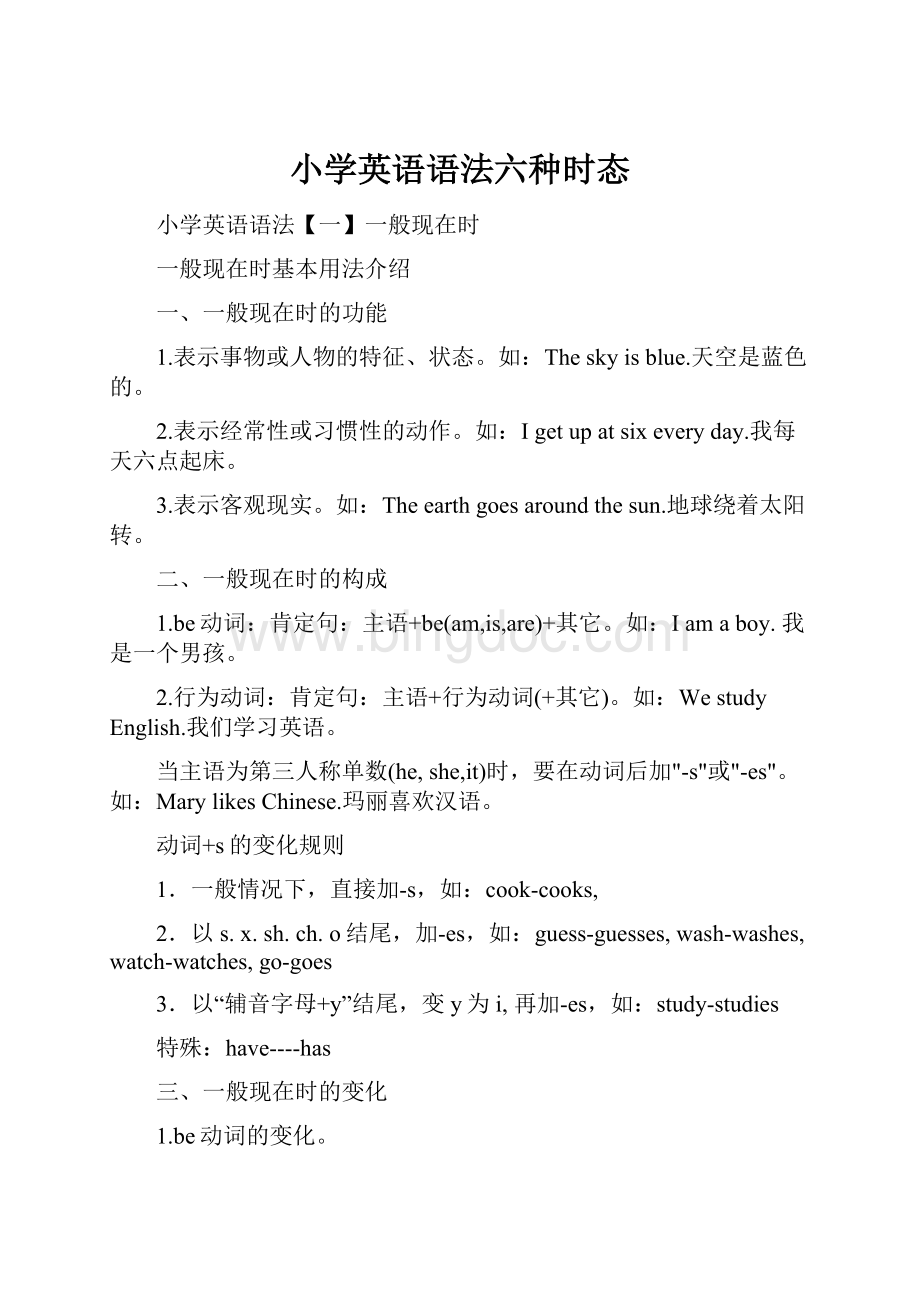小学英语语法六种时态Word文件下载.docx
《小学英语语法六种时态Word文件下载.docx》由会员分享,可在线阅读,更多相关《小学英语语法六种时态Word文件下载.docx(19页珍藏版)》请在冰点文库上搜索。

-Yes.Iam./No,I'
mnot.
特殊疑问句:
疑问词+一般疑问句。
Whereismybike?
2.行为动词的变化。
主语+don'
t(doesn'
t)+动词原形(+其它)。
Idon'
tlikebread.
当主语为第三人称单数时,要用doesn'
t构成否定句。
Hedoesn'
toftenplay.
Do(Does)+主语+动词原形+其它。
-Doyouoftenplayfootball?
-Yes,Ido./No,Idon'
t.
当主语为第三人称单数时,要用does构成一般疑问句。
-Doesshegotoworkbybike?
-Yes,shedoes./No,shedoesn'
疑问词+一般疑问句?
Howdoesyourfathergotowork?
练习
1.Heoften________(have)dinnerathome.
2.DanielandTommy_______(be)inClassOne.
3.We_______(notwatch)TVonMonday.
4.Nick_______(notgo)tothezooonSunday.
5.______they________(like)theWorldCup?
6.What_______theyoften_______(do)onSaturdays?
7._____yourparents_______(read)newspaperseveryday?
8.Thegirl_______(teach)usEnglishonSundays.
9.SheandI________(take)awalktogethereveryevening.
10.There________(be)somewaterinthebottle.
11.Mike_______(like)cooking.
12.They_______(have)thesamehobby.
13.Myaunt_______(look)afterherbabycarefully.
14.Youalways_______(do)yourhomeworkwell.
15.I_______(be)ill.I’mstayinginbed.
16.She_______(go)toschoolfromMondaytoFriday.
17.LiuTao_______(do)notlikePE.
18.Thechildoften_______(watch)TVintheevening.
19.SuHaiandSuYang_____(have)eightlessonsthisterm.
20.-Whatday_____(be)ittoday?
-It’sSaturday.
小学英语语法【二】现在进行时
现在进行时
1.现在进行时表示现在正在进行或发生的动作,也可表示当前一段时间内的活动或现阶段正在进行的动作。
2.现在进行时的肯定句基本结构为be+动词ing.
3.现在进行时的否定句在be后加not。
4.现在进行时的一般疑问句把be动词调到句首。
5.现在进行时的特殊疑问的基本结构为:
疑问词+be+主语+动词ing?
但疑问词当主语时其结构为:
疑问词+be+动词ing?
标志词:
looknowlistenIt’s+点钟
动词加ing的变化规则
1.一般情况下,直接加ing,如:
cook-cooking
2.以不发音的e结尾,去e加ing,如:
make-making,taste-tasting,write—writing,ride—riding,have—havingcome—comingdance—dancinglive—livingtake—takingskate—skating
3.如果末尾是一个元音字母和一个辅音字母,双写末尾的辅音字母,再加ing,如:
swim—swimmingbegin—beginningrun-running,sit—sittingput—puttingget—gettingshop—shoppingstop--stopping
现在进行时练习
1.Theboy__________________(draw)apicturenow.
2.Listen.Somegirls_______________(sing)intheclassroom.
3.Mymother_________________(cook)somenicefoodnow.
4.What_____you______(do)now?
5.Look.They_______________(have)anEnglishlesson.
6.They____________(not,water)theflowersnow.
7.Look!
thegirls________________(dance)intheclassroom.
8.Whatisourgranddaughterdoing?
She_________(listen)tomusic.
9.It’s5o’clocknow.We_____________(have)suppernow
10.______Helen____________(wash)clothes?
Yes,sheis.
小学英语语法【三】一般将来时
一、概念:
表示将要发生的动作或存在的状态及打算、计划或准备做某事。
句中一般有以下时间状语:
tomorrow,nextday(week,month,year…),soon,thedayaftertomorrow(后天)等。
二、基本结构:
①begoingto+do;
②will+do.
三、否定句:
在be动词(am,is,are)后加not或情态动词will后加not成won’t。
例如:
I’mgoingtohaveapicnicthisafternoon.→I’mnotgoingtohaveapicnicthisafternoon.
四、一般疑问句:
be或will提到句首,some改为any,and改为or,第一二人称互换。
Wearegoingtogoonanoutingthisweekend.→Areyougoingtogoonanoutingthisweekend?
五、对划线部分提问。
一般情况,一般将来时的对划线部分有三种情况。
1.问人。
Who
I’mgoingtoNewYorksoon.→Who’sgoingtoNewYorksoon.
2.问干什么。
What…do.
Myfatherisgoingtowatcharacewithmethis
afternoon.
→Whatisyourfathergoingtodowithyouthisafternoon.
3.问什么时候。
When.
She’sgoingtogotobedatnine.→Whenisshegoing
tobed?
六、同义句:
begoingto=will
Iamgoingtogoswimmingtomorrow(明天).=Iwillgoswimmingtomorrow.
11.Todayisasunnyday.We___________________(have)apicnicthisafternoon.
12.Mybrother_______________(go)toShanghainextweek.
13.Tomoften______________(go)toschoolonfoot.Buttodayisrain.He__________(go)toschoolbybike.
14.Whatdoyouusuallydoatweekends?
Iusually__________(watch)TVand____________(catch)insects?
15.It’sFridaytoday.What___she____(do)thisweekend?
She______(watch)TVand_______(catch)insects.
16.What___________(d0)youdolastSunday?
I____________(pick)applesonafarm.What______________(do)nextSunday?
I______________(milk)cows.
17.Mary____________(visit)hergrandparentstomorrow.
18.LiuTao____________(fly)kitesintheplaygroundyesterday.
19.David______________(give)apuppetshownextMonday.
20.I________________(plan)formystudynow
小学英语语法【四】一般过去时
一、一般过去时语法介绍
1.一般过去时表示过去某个时间发生的动作或存在的状态,常和表示过去的时间状语连用。
一般过去时也表示过去经常或反复发生的动作感谢。
2.Be动词在一般过去时中的变化:
⑴am和is在一般过去时中变为was。
(wasnot=wasn’t)
⑵are在一般过去时中变为were。
(werenot=weren’t)
⑶带有was或were的句子,其否定、疑问的变化和is,am,are一样,即否定句在was或were后加not,一般疑问句把was或were调到句首。
3.句中没有be动词的一般过去时的句子
否定句:
didn’t+动词原形,如:
Jimdidn’tgohomeyesterday.
一般疑问句:
在句首加did,句子中的动词过去式变回原形。
DidJimgohomeyesterday?
特殊疑问句:
⑴疑问词+did+主语+动词原形?
WhatdidJimdoyesterday?
⑵疑问词当主语时:
疑问词+动词过去式?
Whowenttohomeyesterday?
二、动词过去式变化规则
1.一般在动词末尾加-ed,如:
pull-pulled,cook-cooked
2.结尾是e加d,如:
taste-tasted
3.末尾只有一个元音字母和一个辅音字母的重读闭音节,应双写末尾的辅音字母,再加-ed,如:
stop-stopped
4.以“辅音字母+y”结尾的,变y为i,再加-ed,如:
study-studied
5.不规则动词过去式:
词义
现在(原形)
过去式
是
am,is(be)
was
忘记
forget
forgot
are(be)
were
得到
get
got
成为
become
became
给
give
gave
开始
begin
began
走
go
went
弯曲
bend
bent
成长
grow
grew
吹
blow
blew
有
have,has
had
买
buy
bought
听
hear
heard
能
can
could
受伤
hurt
捕捉
catch
caught
保持
keep
kept
选择
choose
chose
知道
know
knew
来
come
came
学习
learn
learned,learnt
切
cut
允许,让
let
做
do,does
did
躺
lie
lay
画
draw
drew
制造
make
made
饮
drink
drank
可以
may
might
吃
eat
ate
意味
mean
meant
感觉
feel
felt
会见
meet
met
发现
find
found
必须
must
飞
fly
flew
放置
put
读
read
将
shall
should
骑、乘
ride
rode
唱歌
sing
sang
响、鸣
ring
rang
坐下
sit
sat
跑
run
ran
睡觉
sleep
slept
说
say
said
speak
spoke
看见
see
saw
度过
spend
spent
扫
sweep
swept
(一)
用be动词的适当形式填空
1.I_______atschooljustnow.
2.He________atthecamplastweek.
3.We________studentstwoyearsago.
4.They________onthefarmamomentago.
5.YangLing________elevenyearsoldlastyear.
6.There________anappleontheplateyesterday.
7.There_______somemilkinthefridgeonSunday.
五、行为动词的过去时练习一
(一)用行为动词的适当形式填空
1.He_________(live)inWuxitwoyearsago.
2.Thecat________(eat)abirdlastnight.
3.We_______(have)apartylastHalloween.
4.Nancy________(pick)uporangesonthefarmlastweek.
5.I______(make)amodelshipwithMikeyesterday.
6.They______(play)chessintheclassroomlastPElesson.
7.Mymother_______(cook)anicefoodlastSpringFestival.
8.Thegirls____(sing)and___(dance)attheparty.
小学英语语法【五】现在完成时
1)现在完成时通常表示过去发生或已经完成的某一动作对现在造成的影响和结果。
说话人强调的是该动作或状态对现在的结果或影响。
Mydaughterhasjustgoneout.我女儿刚出去。
I’msurewe’vemetbefore.我肯定我们以前见过面。
Shehasarrived.她到了。
2)表示开始于过去并持续到现在的动作或状态,往往和包括现在在内的表示一段时间的状语连用,如recently,already,just,lately,for…,since…,yet等。
Ihaven’theardfromherthesedays.这些日子我没有收到她的信。
Wehaven’tseenyourecently.最近我们没有见到你。
Theyhavebeenawayfortwoyears.他们离开已经两年了。
ShehasbeenwithussinceMonday.
3).现在完成时还可以用来表示过去的一个时间到现在这段时间内重复发生的动作.
Wehavehadfourtextsthissemester.
6.havebeento和havegoneto的区别
havebeento强调“去过”,现已不在那里,如:
HehasbeentotheUSAthreetimes.
他到美国去过三次。
(过去“到美国”,现在已“不在美国”)
havegoneto主要强调的是“去了”,现在人不在说话的现场,如:
--Where'
syourmother?
--你妈妈在哪?
--Shehasgonetothehospital.--她去医院了。
一结构
1.肯定句:
主语+have/has+动词的过去分词+其他
2.否定句:
主语+have/has+not+动词的过去分词+其他
3.一般疑问句:
have/has+主语+动词的过去分词+其他
Yes,主语+have/has.No,主语+have/has+not
4.特殊疑问句:
特殊疑问词+have/has+主语+动词的过去分词+其他
二常和现在完成时一起连用的时间状语
注意:
.现在完成时不能单独与准确时间连用,(如表示过去的时间状语)如yesterday(morning、afternoon),last(morning、afternoon)等,除非与for,since连用.
1.现在完成时往往同表示不确定的过去时间状语连用
如already(肯定),yet(否定,疑问),just,before,recently,still,lately,Just,already,yet,ever,never,before,twice(重复性时间),for+短时间,since+点时间,sofar,howlong提问的疑问句中.......
Hehasalreadyobtainedascholarship.
Ihaven'
tseenmuchofhimrecently(lately).
Wehaveseenthatfilmbefore.
Havetheyfoundthemissingchildyet?
2.现在完成时常常与表示频度的时间状语连用,
如ever,never,twice,severaltimes等:
HaveyoueverbeentoBeijing
IhaveneverheardBunnysayanythingagainsther.
Ihaveusedthispenonlythreetimes.Itisstillgood.
Georgehasmetthatgentlemanseveraltimes.
3.现在完成时还往往可以同包括现在时间在内的时间状语连用,
如uptothesefewdays/weeks/months/years,just,uptopresent(now),sofar等:
Peterhaswrittensixpaperssofar.
Uptothepresenteverythinghasbeensuccessful.
三当现在完成时与表示短时间的时间状语连用时,谓语动词必须使用延续性动词。
如果谓语动词是非延续性动词则转化为对应的延续性动词。
若不是和短时间连用,则不用转化。
英语的行为动词有持续性动词和瞬间性动词之分,使用中应注意两者的区别。
1.持续性动词:
表示一个动作可以持续一段时间或更长时间。
常见的study,play,do,read,learn,drive,write,clean,sleep,speak,talk,wait,fly,stay,sit,stand,lie,keep等。
2.瞬间性动词:
表示一个动作发生在一瞬间,非常短暂。
亦称终止性动词。
常见的--begin,start,finish,go,come,leave,find,getup,arrive,reach,getto,enter,hear,stop,open,close,become,buy,borrow,lend,happen,join,lose,renew,die,takeaway,putup,setout,puton,geton/off等
3.瞬间性动词在完成时中如要与表示持续一段时间的状语连用,通常用意思相当的持续性动词来替换
Hehasbeeninthearmy/asoldierforthreeyears.(他参军已有3年了。